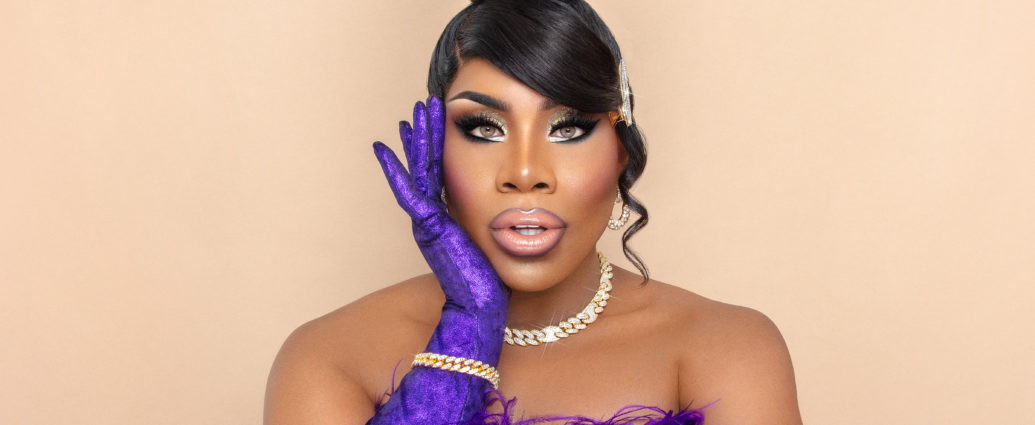RuPaul’s Drag Race winner Monét X Change stars in a campy, comedic opera.
WORDS BY Isabelle Wattenberg
To fill the role of the Duchess of Krakenthorp–a regal, commanding, and highly decorated character in the Minnesota Opera’s upcoming production of Gaetano Donazetti’s La Fille Du Regiment, or The Daughter of the Regiment, the team took a democratic approach. They made a wishlist and distributed it among artistic and production staff for feedback. The list included TV personalities, celebrities, and notable artists. One name rose to the top: Monét X Change: comedian, artist, and double crown winner of RuPaul’s Drag Race. Cue a few lucky connections, and this February, audiences will see Monét grace the stage–and sing her own aria–in drag.
“The role originally was created for a comedian…you are looking for someone with excellent comedic timing and someone who, if they’re not closely associated with opera, at least understand the operations,” says Ryan Taylor, Minnesota Opera president and general director. “People don’t necessarily recognize [Monét’s] operatic training and the way she became intrigued by opera as a creative art form, but it is in her.”
Monét, who studied opera as a student, earned the title of Miss Congeniality in Season 10 of Drag Race and won All Stars 4. She now hosts her own talk show, The XChange Rate, and co-hosts comedy podcast Sibling Rivalry. As the Duchess, she joins a string of notable but unexpected guests who’ve taken on the cameo role, including Bea Arthur, Ruth Bader Ginsburg, and Kathleen Turner.
“Opera was my love, the way I first found art,” says Monét. “To be coming back to my first love, essentially, and doing it on this huge stage that is the Minnesota Opera, and to be doing it in drag feels unreal.”
Monét’s participation invited some subtle but powerful changes to the production. To highlight her vocal talent, the team added an aria to the spoken role, interpolating a song from another bel canto opera. The Duchess is also usually portrayed as an evil villain, but the dialog was rewritten slightly, according to Taylor, to convey “she is also part of a societal framework and her behavior as a villain is in some way explainable given the structure of society in a time that she existed. It makes the character of the Duchess a little more three-dimensional.”
At first glance, The Daughter of the Regiment, composed by Donazetti, is a simple, amusing romp—a young girl, adopted and raised in the barracks with a group of soldiers for fathers, falls in love, uncovers her forgotten past, and must choose between the world she knows and family destiny. But it upends the all-too-typical damsel-in-distress storyline by giving its lead the power of choice and self determination.
“Unlike many pieces of the inherited repertoire, where a central figure character is subjected to societal whim of convention or the patriarchy, this piece is unique when a female character finds a way to stand up for herself and her trajectory and create an ending that she wants for her dramatic arc,” says Taylor. “As the finale approaches she says, ‘This is what I’m doing,’ and everyone just gets on board.”
Between the opera’s inherent subversiveness and Monét’s splashy appearance, the cast and crew hope to intrigue both seasoned opera-goers and Drag Race fans who are eager to see Monét celebrated and performing on stage again. Monét said she’s excited to showcase opera’s relevance–especially to those who previously haven’t considered the art form for themselves.
“Opera can seem a little gatekeeper-y sometimes and I think a lot of people on the outside looking in think that opera can’t be for them. I want my performing here, my role as the duchess, to show people that opera is accessible to them,” she says. “And by that way they will discover…. how soothing, how brilliant these operas are. When they hear Mes Amis they will be like, ‘Wow, I did not know this was here because I didn’t think it was for me.’ I hope to show people the accessibility and how fierce opera is.”
Taylor says La Fille Du Regiment is a welcoming first-time opera experience—for Donazetti’s sparkling overtures and lustrous melodies, but also for its clever story.
“This opera is a really good starting opera for someone who’s brand new to the art form, because it’s actually funny. There are pieces we call ‘comedies’ in opera…and the bar you have to graduate past is, no one dies,” Taylor says. “Sometimes people will feel you’re not treating opera well enough if you make it funny. [The performers] are all quite capable of understanding style and performance, and they deliver performance with a practiced beauty. The comedy comes quite easily to them.”
Comedy certainly comes easily to Monét–and this role is an opportunity for her to channel her artistic, stylistic, and comedic talents into one powerful performance.
“I am making this role my own by really tapping into the draggy-ness of the Duchess. This is a comic opera. I love comic opera.. there are many avenues for you to be over the top,” she says. ”I want to give the audience a real treat into this over-the-top-ness and the camp that is in this opera to be devoured.”

